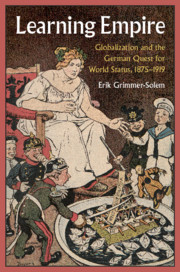Book contents
- Learning Empire
- Learning Empire
- Copyright page
- Contents
- Illustrations
- Acknowledgments
- Abbreviations
- Introduction
- Part I Absent-Minded Empire, 1875–1897
- Part II Empire Imagined, 1897–1907
- 4 World Policy
- 5 The High Seas Fleet and Power Politics
- 6 National Efficiency and the New Mercantilism
- 7 Formal and Informal Empire
- 8 Empire in Crisis
- Part III Empire Lost, 1908–1919
- Epilogue
- Selected Bibliography
- Index
4 - World Policy
from Part II - Empire Imagined, 1897–1907
Published online by Cambridge University Press: 20 September 2019
- Learning Empire
- Learning Empire
- Copyright page
- Contents
- Illustrations
- Acknowledgments
- Abbreviations
- Introduction
- Part I Absent-Minded Empire, 1875–1897
- Part II Empire Imagined, 1897–1907
- 4 World Policy
- 5 The High Seas Fleet and Power Politics
- 6 National Efficiency and the New Mercantilism
- 7 Formal and Informal Empire
- 8 Empire in Crisis
- Part III Empire Lost, 1908–1919
- Epilogue
- Selected Bibliography
- Index
Summary
This chapter focuses on the formal German response to the challenges of globalization and the new imperialism discussed in the previous chapters, culminating in Kaiser Wilhelm’s shift to “World Policy” and the bid to build a large battleship navy in 1897. The complex of ideas, interests, and personalities that shaped this policy are analyzed in depth, revealing that educated middle-class liberal opinion was much more decisive in this shift than is usually appreciated. Prominent in this process were the ideas and perceptions of Gustav Schmoller and his students. Schmoller knew Alfred Tirpitz and had the ear of Bernhard von Bülow, and Ernst von Halle and Hermann Schumacher were easily drawn into Tirpitz’s legislative campaign to significantly expand the German fleet on their return to Germany. They became part of a very sophisticated and effective naval propaganda effort that mobilized the German professoriate and culminated in passage of the first navy bill in April 1898 which dramatically increased the size of Germany’s battleship navy into a deterrent “risk fleet.”
Keywords
- Type
- Chapter
- Information
- Learning EmpireGlobalization and the German Quest for World Status, 1875–1919, pp. 165 - 212Publisher: Cambridge University PressPrint publication year: 2019



